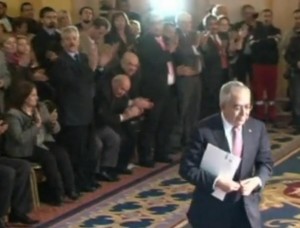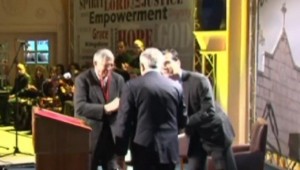Dexter Van Zile reported this week, that a week after PA Prime Minister Salam Fayyad addressed the Christ at the Checkpoint (CATC) conference, the PA informed Palestinian church leader Stephen Khoury that his church “lacked the authority to function”, as a religious institution in the PA.
The church can still gather to pray, for now, but the PA’s decision conveyed on Saturday will have a real impact on the members of First Baptist, which endured numerous bomb attacks during the First Intifada.
“They said that our legitimacy as a church from a governmental point of view is not approved,” said Khoury’s son, Steven, who serves as an assistant pastor at First Baptist. “They said they will not recognize any legal paper work from our church. That includes birth certificates, wedding certificates and death certificates. Children are not even considered to be legitimate if they don’t have recognized paperwork.”
The irony, Steven said, is that the PA’s announcement comes right after the Christ at the Checkpoint Conference.
Many people have picked up on this irony, as the PA’s Prime Minister Salam Fayyad himself addressed CATC, just days before this decision came to light.
Bear in mind, CATC was organised by Bethlehem Bible College, which is an evangelical Bible college. Indeed, last month Eastern Orthodox Christians on a web forum belittled CATC for being evangelical and not Orthodox, and therefore not truly representing Palestinian Christianity.
In response, CATC organisers Porter Speakman and Munther Isaac have written an article addressing concerns raised about CATC, and the timing of the decision about Khoury’s church.
Speakman and Isaac write:
Unlike traditional churches like the Greek Orthodox and Catholics, Evangelical churches in the Palestinian Territories are not officially recognized and therefore things like marriage documents are not considered legitimate by government authorities. They have the freedom to worship, but are not “official.”
They continue:
For the last few years, there have been many discussions between Evangelical church leaders, including those who organized and spoke at the Christ at the Checkpoint, and officials from the PA.
If the PA and CATC leadership have been in discussion, it has not born any fruit. The PA does not consider Palestinian evangelical Christians to be legitimate at all.
However, it appears that both parties consciously decided to oppose pro-Zionist theology in public.
This would explain why Salam Fayyad was not publicly challenged at all by anyone at CATC, as he gave his address to the conference.
This is Munther Isaac’s introduction to Fayyad:
“Palestinian Christians have always enjoyed the support of the Palestinian leaders. We worship with freedom and exercise our rights like all Palestinians. To emphasise this, we are deeply honoured to have the support of prime minsiter of the Palestinian Authority, Dr Salam Fayyad. Since 2007, Dr Salam has worked so hard to prepare Palestine for statehood, and his efforts in building the Palestinian economy and institutions have been described as ‘absolutely first-class, professional, courageous and intelligent’. Above all, Dr Fayyad is a man of vision, and his vision is one of prosperity and peace for the Palestinian people. And it is only fitting that his name in Arabic literally means ‘among them peace’. It is my privilege and honour to invite to us here, to the stage to speak to us, Prime Minister of the Palestinian Authority, Dr Salam Fayyad.
So Munther Isaac does not mention the PA discrimination against evangelical Christians, despite being a Palestinian evangelical at a Palestinian evangelical conference.
Consequentially, the attitude of the CATC towards Fayyad was deferential:
Speakman and Isaac further write in their article, about Palestinian churches:
The recognition does not depend entirely on the PA, and the input of the churches already recognized is as equally important. In addition, the congregational nature of the Evangelical churches and the absence of a recognized hierarchy complicate things.
This seems odd. If the recognition does not depend entirely on the PA, then who else does it depend on? Surely it does depend on the PA.
It appears as if Speakman and Isaac are trying to play down the responsibilty of the PA, in the issue of church recognition. Here is their rationalisation, for inviting Salam Fayyad to CATC:
This is why efforts by Christ at the Checkpoint to highlight the Evangelical Palestinian church are so important. Having Palestinian Prime Minister Dr. Salam Fayyad come for the second time in as many conferences to speak and to see first hand what the Bethlehem Bible College and local churches are doing helps, not hinders, the churches efforts for recognition. In addition, the issue of seeking recognition for Evangelical churches in Palestine and in Israel was openly discussed during the conference.
It ought to say something, though, that Salam Fayyad has already been invited to CATC back in 2010, he then met with CATC organisers and Palestinian evangelicals, and nothing changed regarding recognition of evangelical churches. Two years later, Fayyad again is invited, and no progress has been made on the issue.
One of the stated CATC conference goals in English was to “[e]mpower and encourage the Palestinian church”. In order to do so, CATC will need to speak up for the rights of Palestinian Christians.
If they can link this to criticism of the Israeli government, then of course they will do so happily. However, if speaking up for the rights of Palestinian evangelical believers requires open criticism of the PA and of Salam Fayyad’s leadership, then will CATC provide this criticism?
Criticising the PA would be awkward for CATC’s image. Doing so may mean that others will accuse them of being Zionists. Sooner or later, CATC will have to decide which is more important – their anti-Zionist theology and image, or their care for the plight of the Palestinian church.

